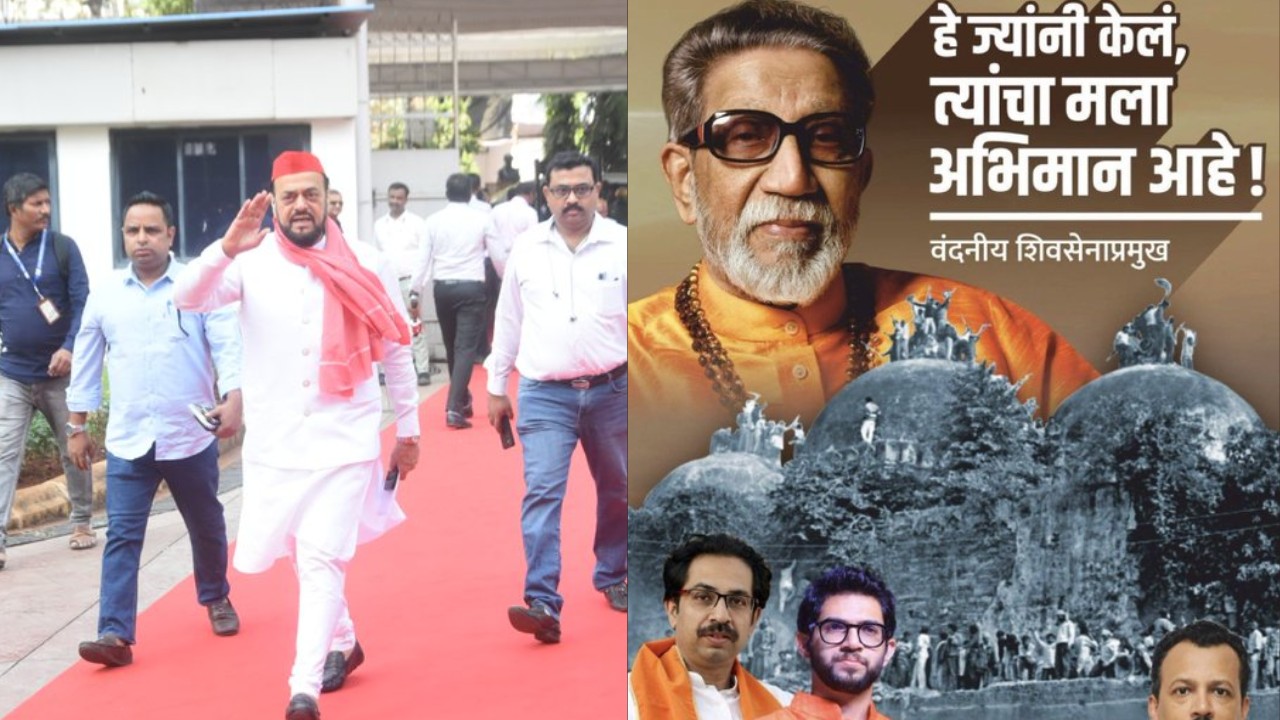
Samajwadi Party Breaks Away from MVA Over Controversial Babri Masjid Comments (X/ NarvekarMilind_ , abuasimazmi)
Maharashtra News: In a significant political upheaval for the Maha Vikas Aghadi (MVA) coalition in Maharashtra, the Samajwadi Party has announced its decision to withdraw from the alliance. This move comes in response to a controversial statement made by Milind Narvekar, a close aide of Uddhav Thackeray, regarding the demolition of the Babri Masjid. On the 32nd anniversary of this contentious event, Narvekar shared a post on social media that included a quote from Shiv Sena founder Balasaheb Thackeray, stating, 'I am proud of those who did this,' alongside images of Uddhav Thackeray and his son, Aaditya Thackeray.
The fallout from this incident has been swift and severe. Abu Asim Azmi, the state president of the Samajwadi Party, expressed his party's discontent with the MVA's direction and its alignment with what he termed 'communal ideologies.' He stated, 'Samajwadi Party can never remain with communal ideology, hence we separate ourselves from Maha Vikas Aghadi.' Azmi's remarks underscore a growing rift within the coalition, which was initially formed on principles of secularism and constitutional integrity.
— Milind Narvekar (@NarvekarMilind_) December 5, 2024
The decision to exit the MVA is rooted not only in ideological differences but also in recent electoral setbacks. The Samajwadi Party holds two seats in the Maharashtra Assembly; however, their performance was overshadowed by the MVA's overall poor showing in the recent elections. Azmi criticized the coalition's lack of coordination during campaign strategies and seat distribution, stating, 'What is the use of continuing in MVA? They don’t talk to us.'
समाजवादी पार्टी को महाराष्ट्र में अकेले चलना गवारा है लेकिन माविकास अघाड़ी में रहते हुए शिवसेना UBT की सांप्रदायिक विचारधारा का हिस्सा बनना हरगिज़ गवारा नहीं!#SamajwadiParty #MahaVikasAghadi #Maharashtra pic.twitter.com/dblr3fIynB
— Abu Asim Azmi (@abuasimazmi) December 7, 2024
In an alarming reflection on the MVA's internal dynamics, Azmi pointed out that if members of the alliance engage in rhetoric similar to that of their rivals in the BJP, it raises questions about their fundamental differences. He remarked, 'If anyone in the MVA speaks such language, what is the difference between the BJP and them? Why should we stay with them?' This sentiment highlights a critical moment for opposition unity in Maharashtra as parties grapple with their identities and alliances.
The political landscape has become even more contentious as newly elected MLAs from the MVA staged a walkout during an oath-taking ceremony in protest against alleged manipulations involving Electronic Voting Machines (EVMs). Aditya Thackeray articulated concerns over what he described as a 'murder of democracy,' asserting that the election results did not reflect public sentiment but rather an engineered outcome facilitated by EVMs.
Other opposition leaders echoed Thackeray's sentiments, calling for a return to traditional ballot paper voting methods to restore faith in electoral processes. Nana Patole from Congress and Jitendra Awhad from NCP voiced their frustrations over what they termed an 'undemocratic attitude' within the ruling Mahayuti coalition.
Rais Shaikh, another prominent figure within the Samajwadi Party, emphasized that Uddhav Thackeray's Shiv Sena must reassess its stance on communal issues. He stated, 'Shiv Sena should reflect on this. A minimum understanding was established to set aside radical Hindu ideologies.' Shaikh's comments signal a demand for clarity and accountability within the coalition as it navigates these turbulent waters.
As political tensions rise and alliances shift, Maharashtra finds itself at a crossroads. The Samajwadi Party's departure from the MVA not only marks a critical juncture for opposition politics but also raises broader questions about secularism and communalism in Indian politics today.





Copyright © 2026 Top Indian News
